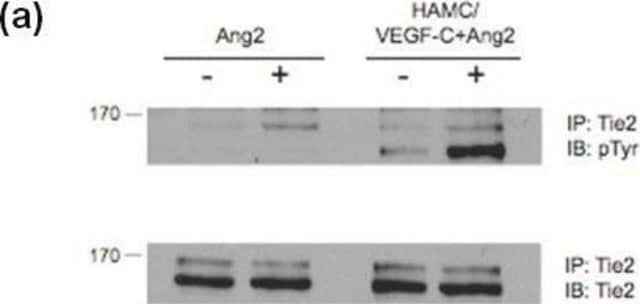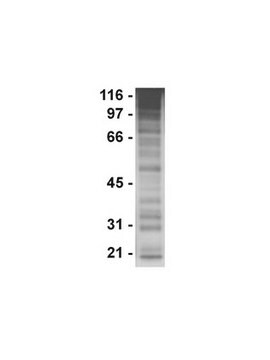05-321MG
Anti-Phosphotyrosine Antibody, clone 4G10®
clone 4G10®, Upstate®, from mouse
Sinónimos:
Clone 4G10 Anti-Phosphotyrosine, Phosphotyrosine Detection Antibody
About This Item
Productos recomendados
biological source
mouse
Quality Level
antibody form
purified from hybridoma cell culture
antibody product type
primary antibodies
clone
4G10®, monoclonal
species reactivity (predicted by homology)
all
manufacturer/tradename
Upstate®
technique(s)
immunoprecipitation (IP): suitable
western blot: suitable
isotype
IgG2bκ
shipped in
wet ice
target post-translational modification
phosphorylation (pTyr)
Application
Quality
Western Blot Analysis:
0.5-2 μg/mL of this lot detected tyrosine-phosphorylated proteins in a modified RIPA lysate from EGF-treated human A431 carcinoma cells (Cohen, B., 1990; Druker, B. J., 1989; Kanakura, Y., 1991).
Target description
Physical form
IgG2bκ mouse monoclonal antibody produced in vitro by mouse-mouse hybridoma 4G10 (FOX-NY [NS-1 derivative] myeloma x spleen cells).
Analysis Note
Positive Antigen Control: Catalog #12-302, EGF-stimulated A431 cell lysate. Add 2.5µL of 2-mercaptoethanol/100µL of lysate and boil for 5 minutes to reduce the preparation. Load 20µg of reduced lysate per lane for minigels.
Other Notes
Legal Information
¿No encuentra el producto adecuado?
Pruebe nuestro Herramienta de selección de productos.
Optional
Storage Class
12 - Non Combustible Liquids
wgk_germany
WGK 2
flash_point_f
Not applicable
flash_point_c
Not applicable
Certificados de análisis (COA)
Busque Certificados de análisis (COA) introduciendo el número de lote del producto. Los números de lote se encuentran en la etiqueta del producto después de las palabras «Lot» o «Batch»
¿Ya tiene este producto?
Encuentre la documentación para los productos que ha comprado recientemente en la Biblioteca de documentos.
Nuestro equipo de científicos tiene experiencia en todas las áreas de investigación: Ciencias de la vida, Ciencia de los materiales, Síntesis química, Cromatografía, Analítica y muchas otras.
Póngase en contacto con el Servicio técnico








